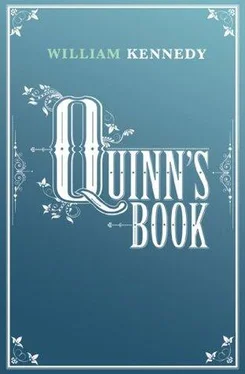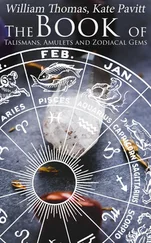The squirmers in the audience, spellbound since the mention of bestiality, were at last roused to indignation by the profanity, and a dozen or more men and women rose from their seats, a few shouting out to take Quinn off the platform. But as they left, Quinn moved to the platform’s edge, pointed after them and shouted, “Do you know the reality of Eli Plum of Albany?”
He stopped some in their exit and riveted the hardy remainder. Then he genuflected in front of them all and blessed himself with the sign of the cross.
“We called him Peaches Plum,” said Quinn, “and he was never worth much in any context you might want to discuss. He was one of your neighbors, and he and I went to school together here fifteen, twenty years ago. We were in Virginia, and we heard the drum corps beating a muffled Dead March in the woods near us and we all knew what was coming. Before long, orders came down to form with the whole First Division, and the Forty-fourth moved out onto elevated ground, facing an open field. The men formed a line, division front, facing five fresh graves.
“That, my friends, was a fearful sight. Also very rousing somehow, with all those brass buttons and rifles shining in the sun, and kids watching from trees, and older men alone on horses, or on top of rooves, and everybody’s eye on Peaches and four other boys as they came walking: two, two, and one. Peaches was the one, walking behind the drum corps, and followed by the provost guard, fifty of them with bayonets fixed. Five clergymen walked along, too, reading scriptures, and thirty pallbearers carried five new coffins. The procession went up and back the length of the whole line of battle and then the pallbearers stopped at the fresh graves. The five prisoners stopped, too, and stood there with their hands tied, a guard alongside each one of them. Then those five young men sat down on their coffins.
“I never got to talk privately with Peaches, but I dug up his story, once I saw it was him. Never wrote it, though, and I’m only telling it now because Will Canaday says you folks are hounds for reality.
“Peaches was a bounty jumper who joined the army eighteen times. You only got a fifty-dollar bounty for joining up when Peaches started his jumping career. Used to be there was enough henpecked husbands, and third sons, and boys who got girls in trouble, who were glad to go to war and improve their outlook. But the war kept on going and volunteers fell away to a trickle, and so the price of bounties went up, all the way to a thousand dollars, which is what they’re paying right now. Peaches, he made lots of money enlisting but he never got to keep it. When he’d light out he’d always bring the cash back home to his pa, like he was supposed to. Then one day after the draft came in, Peaches’s pa told him, ‘Go join up the army again, Peaches, only this time don’t come back because you’re going in place of your brother.’ This brother was a lawyer, a son the father couldn’t do without, the way he could do without Peaches.
“All those times Peaches joined up he never got close to a battle. He’d just disappear during the night off a train, or on a march toward some regiment, then head back home to Pa. But this time Peaches finally went to war. He saw a lot of corpses and didn’t want to become one of those, so he drew on his talents and his instincts, and he took out for points north. And he ran right into another unit and got court-martialed for desertion along with the four other boys who ran with him. They were all found guilty and the President approved they be shot as a warning to cowards and mercenary men in the army. I guess we all know how many good soldiers have the impulse to run, but somehow don’t, either out of fear, or good sense, or because they want to kill rebs. One youngster told me, ‘I’m stickin’ because we got justice on our side.’ Lot of rebs think the same way, but that doesn’t matter. Death’s all that matters, and I know you all want the reality of that, just like the folks back home in the real olden days who wanted to know how their war was going. And their soldiers would collect the heads and genitals of the enemy and bring ’em back home for inspection to prove the army was doing its job. Peaches never got into any of that kind of fun. He was just one of those poor souls who fumble their way through life, never quite knowing the rules, never playing by them even if they think they know them, always fated to be a pawn of other folks.
“Poor Peaches. Grizzled men around me were crying as the provost guard took up its position, ten guardsmen for each of the five prisoners, rifles ready, standing about fifteen yards away, while the captain of the guard read the five orders of execution out loud. The clergy came by and talked to each of the prisoners for a few minutes, and then the officers started putting those white blindfolds on the chosen five.
“I could see Peaches really clear, see him crying and quaking, and before I knew what I was doing I’d called out, ‘So long, Peaches, and good luck,’ which wasn’t very appropriate, I admit, but that’s what I said. Peaches looked toward my voice and nodded his head. ‘Okay,’ he yelled. Then his blindfold was on, the black cap was placed over his face, and it was ready, aim, fire. Four of the prisoners fell backward onto their coffins. Peaches took the bullets and didn’t let them knock him over. He crumpled in place and I never felt more an outsider in this life. All that pomp and panoply in service of five more corpses. It’s a question, I’ll tell you. But that’s all that’s left in me — a kind of fatal quizzicality, you might call it. I hope my sharing it with you has been of some value.”
And Quinn left the platform.
QUINN, THAT FORMIDABLE FOLKLORIST, walked along amid throngs of other souls like himself and he took sight of a picture photograph that revealed how a man will sometimes stand alongside of a horse. Quinn then said to himself, “I have a horse, but not so fine a horse.” This was a truth that served no purpose for Quinn, and yet he felt a goad. He went to his friend the editor, who wrote wisely about the great warps and goiters people must bear in this life, and his friend said to him, “I think it is time you took up with your platter.”
Quinn then went with his friend to a place where they met a man with chinwhiskers who opened a great door and took out from it The Great Platter of the Unknown that Quinn had long ago found at the bottom of a birdcage.
“This is a great thing,” Quinn said when he felt the heft of it. “I wish I knew what it was.”
“Well, you’ll never know that,” said his friend, “for you’re not smart enough.”
“I’m smarter than many,” said Quinn.
“We’ll not dispute that. Just carry it with you and it won’t bother anyone at all that you don’t know what it is.”
And so Quinn went to the slaughterhouse and bought a pig’s bladder and blew it up like a balloon and then soaked it in whiskey until it was strong and put the platter inside it and slung it over his back with a thong.
“You’re on your way,” said his friend.
“I am,” said Quinn.
“Do you know where you’re going?” said his friend.
“I do not.”
“Will you know when you get there?”
“I might,” said Quinn, “or I might not.”
“Then I’ll go with you,” said his friend. “I’m going in that direction myself.”
And so the two rode their horses, one each, and found themselves at the house where the woman known as The Great Mother had lived until she was done in severely. As they entered they heard the voice of an archangel in the music room. They stopped where they stood and Quinn said, “It is a man’s duty to sing.”
“And when one man sings,” said his friend, “it is another man’s duty to listen.”
Читать дальше












